2010年12月英语六级翻译答案及解析
2010年12月六级英语考试翻译参考答案

2010年12月六级英语考试翻译参考答案听力原文(SecA 11-14题)11. W: This is one of our best and least expensive two-bedroomlistings. It’s located in a quiet building and it’s close to bus lines。
M: That maybe true. But look at it, it’s awful, the paint has peeled off and carpet is worn and the stove is ancient。
Q: What can we infer from the conversation?12. M: The pictures we took at the botanical garden should be ready tomorrow。
W: I can’t wait to see them, I’m wondering if the shots I took are as good as I thought。
Q: What is the woman eager to know?13. W: The handle of the suitcase is broken. Can you have it fixed by next Tuesday?M: Let me see, I need to find a handle that matches but tha t shouldn’t take too long。
Q: What does the man mean?14. M: This truck looks like what I need but I’m worried aboutmaintenance. For us it’ll have to operate for long periods of time invery cold temperatures。
2010年12月18日六级英语答案CET6

2010年12月18日六级英语答案CET6参考答案Part ⅠWritingMy View on University RankingIn recent years, all kinds of University Ranking Lists can be found on some educational websites, or newspapers. The ranking standards also vary. These lists have great influence on students. They are even becoming the only scale to evaluate the colleges and universities.People hold different views toward this phenomenon. Some believe that these lists help the students a lot, especially for those who will choose their university. While some other protest vigorously. In their points, the list is really ridiculous and harmful. In my view, the university ranking may have its own reference values, but its disadvantages overweigh its values.For those university-students-to-be, they are supposed to choose the school according to his or her own situation, but not the so-called Ranking List. What’s more, how about the university students? How do they feel about themselves when they see the ranking? The list may become some intangible shackles for them if their own school ranks poorly.In a nutshell, there is no easy method to rank these universities, but the Ranking, only helps students ignore the essentials, namely, their ninety-nine percent perspiration.Part ⅡReading Comprehension(Skimming and Scanning)1.A not be sustained in the long term解析:关键字1994对应第一段第三行,题干中unsustainable即选项A中sustained的反义表达方式。
2010年12月英语六级真题及详细答案解析【完整版】

2010年12月英语六级真题及详细答案解析【完整版】2010年12月大学英语六级考试真题Part I Writing (30 minutes)Direction: For this part, you are allowed 30 minutes to write a short essay entitled My Views on University Ranking. You should write at least 150 words following the outline given below.1. 目前高校排名相当盛行;2. 对于这种做法人们看法不一;3. 在我看来……My Views on University Ranking.Part II Reading Comprehension (Skimming and Scanning) (15 minutes)Directions: In this part, you will have 15 minutes to go over the passage quickly and answer the questions on Answer Sheet 1. For questions 1-7, choose the best answer from the four choices marked [A], [B], [C] and [D]. For questions 8-10, complete the sentences with the information given in the passage.Into the UnknownThe world has never seen population ageing before. Can it cope?Until the early 1990s nobody much thought about whole populations getting older. The UN had the foresight to convene a “world assembly on ageing” back in 1982, but that came and went. By 1994 the World Bank had noticed that something big was happening. In a report entitled “Averting the Old Age Crisis”, it argued that pension arrangements in most countries were unsustainable.For the next ten years a succession of books, mainly byAmericans, sounded the alarm. They had titles like Young vs Old, Gray Dawn and The Coming Generational Storm, and their message was blunt: health-care systems were heading for the rocks, pensioners were taking young people to the cleaners, and soon there would be intergenerational warfare.Since then the debate has become less emotional, not least because a lot more is known about the subject. Books, conferences and research papers have multiplied. International organisations such as the OECD and the EU issue regular reports. Population ageing is on every agenda, from G8 economic conferences to NATO summits. The World Economic Forum plans to consider the future of pensions and health care at its prestigious Davos conference early next year. The media, including this newspaper, are giving the subject extensive coverage.Whether all that attention has translated into sufficient action is another question. Governments in rich countries now accept that their pension and health-care promises will soon become unaffordable, and many of them have embarked on reforms, but so far only timidly. That is not surprising: politicians with an eye on the next electionwill hardly rush to introduce unpopular measures that may not bear fruit for years, perhaps decades.The outline of the changes needed is clear. To avoid fiscal (财政) meltdown, public pensions and health-care provision will have to be reined back severely and taxes may have to go up. By far the most effective method to restrain pension spending is to give people the opportunity to work longer, because it increases tax revenues and reduces spending on pensions at the same time. It may even keep them alive longer. John Rother, the AARP’shead of policy and strategy, points to studies showing that other things being equal, people who remain at work have lower death rates than their retired peers.Younger people today mostly accept that they will have to work for longer and that their pensions will be less generous. Employers still need to be persuaded that older workers are worth holding on to. That may be because they have had plenty of younger ones to choose from, partly thanks to the post-war baby-boom and partly because over the past few decades many more women have entered the labour force, increasing employers’ choice. But the reservoir of women able and willing to take up paid work is running low, and the baby-boomers are going grey.In many countries immigrants have been filling such gaps in the labour force as have already emerged (and remember that the real shortage is still around ten years off). Immigration in the developed world is the highest it has ever been, and it is making a useful difference. In still-fertile America it currently accounts for about 40% of total population growth, and in fast-ageing western Europe for about 90%.On the face of it, it seems the perfect solution. Many developing countries have lots of young people in need of jobs; many rich countries need helping hands that will boost tax revenues and keep up economic growth. But over the next few decades labour forces in rich countries are set to shrink so much that inflows of immigrants would have to increase enormously to compensate: to at least twice their current size in western Europe’s most youthful countries, and t hree times in the older ones. Japan would need a large multiple of the few immigrants it has at present. Public opinion polls show that people in most richcountries already think that immigration is too high. Further big increases would be politically unfeasible.To tackle the problem of agein g populations at its root, “old” countries would have to rejuvenate (使年轻) themselves by having more of their own children. A number of them have tried, some more successfully than others. But it is not a simple matter of offering financial incentives or providing more child care. Modern urban life in rich countries is not well adapted to large families. Women find it hard to combine family and career. They often compromise by having just one child.And if fertility in ageing countries does not pick up? It will not be the end of the world, at least not for quite a while yet, but the world will slowly become a different place. Older societies may be less innovative and more strongly disinclined to take risks than younger ones. By 2025 at the latest, about half the voters in America and most of those in western European countries will be over 50—and older people turnout to vote in much greater number than younger ones. Academic studies have found no evidence so far that older voters have used their power at the ballot box to push for policies that specifically benefit them, though if in future there are many more of them they might start doing so.Nor is there any sign of the intergenerational warfare predicted in the 1990s. After all, older people themselves mostly have families. In a recent study of parents and grown-up children in 11 European countries, Karsten Hank of Mannheim University found that 85% of them lived within 25km of each other and the majority of them were in touch at least once a week.Even so, the shift in the centre of gravity to older age groups is bound to have a profound effect on societies, not justeconomically and politically but in all sorts of other ways too. Richard Jackson and Neil Howe of Ame rica’s CSIS, in a thoughtful book called The Graying of the Great Powers, argue that, among other things, the ageing of the developed countries will have a number of serious security implications.For example, the shortage of young adults is likely to make countries more reluctant to commit the few they have to military service. In the decades to 2050, America will find itself playing an ever-increasing role in the developed world’s defence effort. Because America’s population will still be growing when tha t of most other developed countries is shrinking, America will be the only developed country that still matters geopolitically (地缘政治上).Ask me in 2020There is little that can be done to stop population ageing, so the world will have to live with it. But some of the consequences can be alleviated. Many experts now believe that given the right policies, the effects, though grave, need not be catastrophic. Most countries have recognised the need to do something and are beginning to act.But even then there is no guarantee that their efforts will work. What is happening now is historically unprecedented. Ronald Lee, director of the Centre on the Economics and Demography of Ageing at the University of California, Berkeley, puts it briefly and clearly: “We don’t really know what populatio n ageing will be like, because nobody has done it yet. “注意:此部分试题请在答题卡1上作答。
2010年12月英语6级真题标准答案(含详细解析)
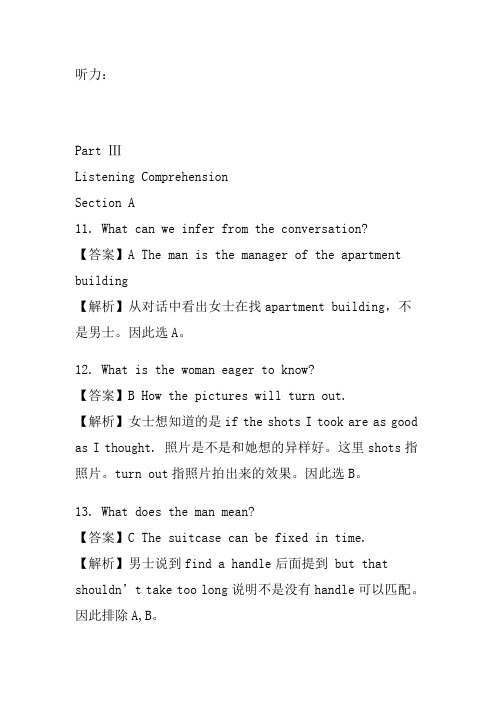
听力:Part ⅢListening ComprehensionSection A11. What can we infer from the conversation?【答案】A The man is the manager of the apartment building【解析】从对话中看出女士在找apartment building,不是男士。
因此选A。
12. What is the woman eager to know?【答案】B How the pictures will turn out.【解析】女士想知道的是if the shots I took are as good as I thought. 照片是不是和她想的异样好。
这里shots指照片。
turn out指照片拍出来的效果。
因此选B。
13. What does the man mean?【答案】C The suitcase can be fixed in time.【解析】男士说到find a handle后面提到 but that shouldn’t take too long说明不是没有handle可以匹配。
因此排除A,B。
14. What do we learn about the man from the conversation?【答案】B He needs a vehicle to be used in harsh weather. 【解析】男士说到truck需要operate for long periods of time in very cold temperatures,因此选择选项B。
very cold temperatures对应harsh weather.15. What do we learn about the woman?【答案】A She has made up her mind to resign.【解析】从文中女士强硬的口气I could no longer live with…可以看出她下定决心。
2010年12月大学英语六级真题及答案(完整详细版)
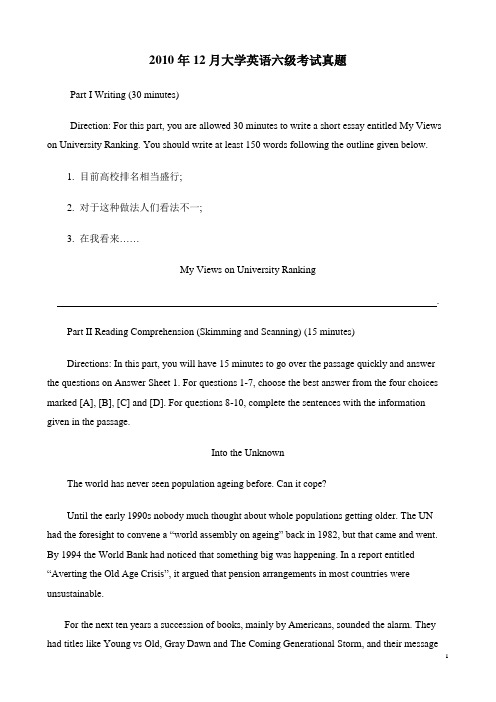
2010年12月大学英语六级考试真题Part I Writing (30 minutes)Direction: For this part, you are allowed 30 minutes to write a short essay entitled My Views on University Ranking. You should write at least 150 words following the outline given below.1. 目前高校排名相当盛行;2. 对于这种做法人们看法不一;3. 在我看来……My Views on University Ranking.Part II Reading Comprehension (Skimming and Scanning) (15 minutes)Directions: In this part, you will have 15 minutes to go over the passage quickly and answer the questions on Answer Sheet 1. For questions 1-7, choose the best answer from the four choices marked [A], [B], [C] and [D]. For questions 8-10, complete the sentences with the information given in the passage.Into the UnknownThe world has never seen population ageing before. Can it cope?Until the early 1990s nobody much thought about whole populations getting older. The UN had the foresight to convene a “world assembly on ageing” back in 1982, but that came and went. By 1994 the World Bank had noticed that something big was happening. In a report entitled “Averting the Old Age Crisis”, it argued that pension arrangements in most countries were unsustainable.For the next ten years a succession of books, mainly by Americans, sounded the alarm. They had titles like Young vs Old, Gray Dawn and The Coming Generational Storm, and their messagewas blunt: health-care systems were heading for the rocks, pensioners were taking young people to the cleaners, and soon there would be intergenerational warfare.Since then the debate has become less emotional, not least because a lot more is known about the subject. Books, conferences and research papers have multiplied. International organisations such as the OECD and the EU issue regular reports. Population ageing is on every agenda, from G8 economic conferences to NATO summits. The World Economic Forum plans to consider the future of pensions and health care at its prestigious Davos conference early next year. The media, including this newspaper, are giving the subject extensive coverage.Whether all that attention has translated into sufficient action is another question. Governments in rich countries now accept that their pension and health-care promises will soon become unaffordable, and many of them have embarked on reforms, but so far only timidly. That is not surprising: politicians with an eye on the next election will hardly rush to introduce unpopular measures that may not bear fruit for years, perhaps decades.The outline of the changes needed is clear. To avoid fiscal (财政) meltdown, public pensions and health-care provision will have to be reined back severely and taxes may have to go up. By far the most effective method to restrain pension spending is to give people the opportunity to work longer, because it increases tax revenues and reduces spending on pensions at the same time. It may even keep them alive longer. John Rother, the AARP’s head of policy and strategy, points to studies showing that other things being equal, people who remain at work have lower death rates than their retired peers.Younger people today mostly accept that they will have to work for longer and that their pensions will be less generous. Employers still need to be persuaded thatolder workers are worth holding on to. That may be because they have had plenty of younger ones to choose from, partly thanks to the post-war baby-boom and partly because over the past few decades many more women have entered the labour force, increasing employers’ choice. But the reservoir of women able and willing to take up paid work is running low, and the baby-boomers are going grey.In many countries immigrants have been filling such gaps in the labour force as have already emerged (and remember that the real shortage is still around ten years off). Immigration in the developed world is the highest it has ever been, and it is making a useful difference. In still-fertile America it currently accounts for about 40% of total population growth, and in fast-ageing western Europe for about 90%.On the face of it, it seems the perfect solution. Many developing countries have lots of young people in need of jobs; many rich countries need helping hands that will boost tax revenues and keep up economic growth. But over the next few decades labour forces in rich countries are set to shrink so much that inflows of immigrants would have to increase enormously to compensate: to at least twice their current size in western Europe’s most youthful countries, and three times in the older ones. Japan would need a large multiple of the few immigrants it has at present. Public opinion polls show that people in most rich countries already think that immigration is too high. Further big increases would be politically unfeasible.To tackle the problem of ageing populations at its root, “old” countries would have to rejuvenate (使年轻) themselves by having more of their own children. A number of them have tried, some more successfully than others. But it is not a simple matter of offering financial incentives or providing more child care. Modern urban life in rich countries is not well adapted to large families. Women find it hard to combine family and career. They often compromise by having just one child.And if fertility in ageing countries does not pick up? It will not be the end of the world, at least not for quite a while yet, but the world will slowly become a different place. Older societies may be less innovative and more strongly disinclined to take risks than younger ones. By 2025 at the latest, about half the voters in America and most of those in western European countries will be over 50—and older people turn out to vote in much greater number than younger ones. Academic studies have found no evidence so far that older voters have used their power at the ballot box to push for policies that specifically benefit them, though if in future there are many more of them they might start doing so.Nor is there any sign of the intergenerational warfare predicted in the 1990s. After all, older people themselves mostly have families. In a recent study of parents and grown-up children in 11European countries, Karsten Hank of Mannheim University found that 85% of them lived within 25km of each other and the majority of them were in touch at least once a week.Even so, the shift in the centre of gravity to older age groups is bound to have a profound effect on societies, not just economically and politically but in all sorts of other ways too. Richard Jackson and Neil Howe of America’s CSIS, in a thoughtful book called The Graying of the Great Powers, argue that, among other things, the ageing of the developed countries will have a number of serious security implications.For example, the shortage of young adults is likely to make countries more reluctant to commit the few they have to military service. In the decades to 2050, America will find itself playing an ever-increasing role in the developed world’s defence effort. Because America’s population will still be growing when that of most other developed countries is shrinking, America will be the only developed country that still matters geopolitically (地缘政治上).Ask me in 2020There is little that can be done to stop population ageing, so the world will have to live with it. But some of the consequences can be alleviated. Many experts now believe that given the right policies, the effects, though grave, need not be catastrophic. Most countries have recognised the need to do something and are beginning to act.But even then there is no guarantee that their efforts will work. What is happening now is historically unprecedented. Ronald Lee, director of the Centre on the Economics and Demography of Ageing at the University of California, Berkeley, puts it briefly and clearly: “We don’t really know what population ageing will be like, because nobody has done it yet. “注意:此部分试题请在答题卡1上作答。
2010年12月英语六级翻译答案及解析

2010年12月英语六级翻译答案及解析2010年12月大学英语六级考试参考答案(翻译部分)82. There is no denying that you ___________(越仔细越好) in dealing with this matter.解析:can never be too careful / can not be too careful【考点解释】本题考查“越仔细越好”“再…也不为过”的固定搭配,即can never be too/can not be too + adj.【原句精释】无可否认,处理这件事,越仔细越好。
83. Only when I reached my thirties __________________________ (我才意识到读书是不能被忽视的)解析:did I realize that reading cannot be neglecteddid I realize that reading is unignorable【考点解释】本题考查由only when 引起的局部倒装。
当only when置于句首,主句用局部倒装,即将助动词置于主语前面。
only when引导句子时态为过去时(reached),为保持时态一致,主句助动词用did;注意被动语态的使用,reading与neglect为被动关系。
同时也可以使用be+adj的结构。
【原句精释】直到三十岁,我才意识不能忽视读书。
84. Much ___________________ (使研究人员感到惊讶),the outcome of the experiment was far better than they had expected.解析:to the researchers’ surprise【考点解释】本题考查固定搭配to one’s surprise 使…惊讶的是…【原句精释】让研究人员大为惊讶的是,实验结果比他们的预计好得多。
2010年12月大学英语六级考试真题及答案及作文及听力原文
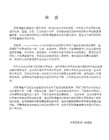
: What does the man mean?
14
M: This truck looks like what I need but I’m worried about maintenance. For us it’ll
have to operate for long periods of time in very cold temperatures.
W I once intended to sell it, but
W: We have several models that are especially adaptive for extreme conditions. Would you
like to see them?
: What do we learn about the man from the conversation?
gift for my wife.
W: Let me see. Oh, we’ve got uite a lot of women’s bags here. Can you give me more detailed
information, such as the color, the size and the trademark?
to wool.
M Maybe we can find something in cotton or silk. Please come this way.
;What does the women want to do?
17
M: Excuse me, Miss?Did anyone happen to turn in a new handbag? You know, it’s a birthday
2010年年底六级真题和答案
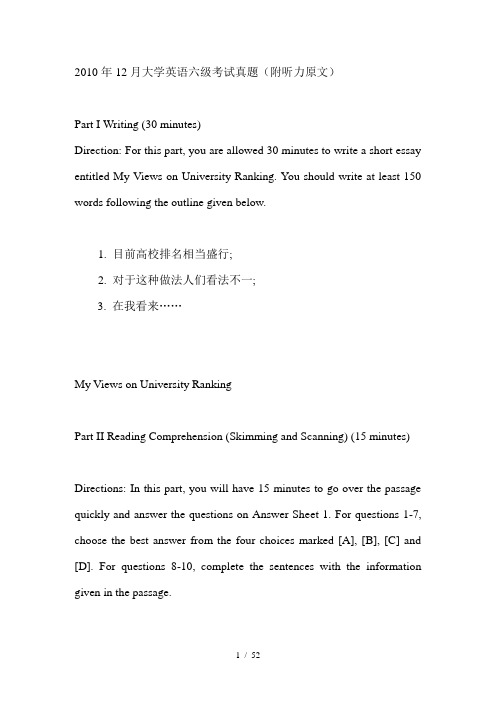
2010年12月大学英语六级考试真题(附听力原文)Part I Writing (30 minutes)Direction: For this part, you are allowed 30 minutes to write a short essay entitled My Views on University Ranking. You should write at least 150 words following the outline given below.1. 目前高校排名相当盛行;2. 对于这种做法人们看法不一;3. 在我看来……My Views on University RankingPart II Reading Comprehension (Skimming and Scanning) (15 minutes)Directions: In this part, you will have 15 minutes to go over the passage quickly and answer the questions on Answer Sheet 1. For questions 1-7, choose the best answer from the four choices marked [A], [B], [C] and [D]. For questions 8-10, complete the sentences with the information given in the passage.Into the UnknownThe world has never seen population ageing before. Can it cope?Until the early 1990s nobody much thought about whole populations getting older. The UN had the foresight to convene a “world assembly on ageing”back in 1982, but that came and went. By 1994 the World Bank had noticed that something big was happening. In a report entitled “Averting the Old Age Crisis”, it argued that pension arrangements in most countries were unsustainable.For the next ten years a succession of books, mainly by Americans, sounded the alarm. They had titles like Young vs Old, Gray Dawn and The Coming Generational Storm, and their message was blunt: health-care systems were heading for the rocks, pensioners were taking young people to the cleaners, and soon there would be intergenerational warfare.Since then the debate has become less emotional, not least because a lot more is known about the subject. Books, conferences and research papers have multiplied. International organisations such as the OECD and the EU issue regular reports. Population ageing is on every agenda, from G8 economic conferences to NATO summits. The World Economic Forum plans to consider the future of pensions and health care at its prestigious Davos conference early next year. The media, including thisnewspaper, are giving the subject extensive coverage.Whether all that attention has translated into sufficient action is another question. Governments in rich countries now accept that their pension and health-care promises will soon become unaffordable, and many of them have embarked on reforms, but so far only timidly. That is not surprising: politicians with an eye on the next election will hardly rush to introduce unpopular measures that may not bear fruit for years, perhaps decades.The outline of the changes needed is clear. To avoid fiscal (财政) meltdown, public pensions and health-care provision will have to be reined back severely and taxes may have to go up. By far the most effective method to restrain pension spending is to give people the opportunity to work longer, because it increases tax revenues and reduces spending on pensions at the same time. It may even keep them alive longer. John Rother, the AARP’s head of policy and strategy, points to studies showing that other things being equal, people who remain at work have lower death rates than their retired peers.Younger people today mostly accept that they will have to work for longer and that their pensions will be less generous. Employers still need to be persuaded that older workers are worth holding on to. That may be because they have had plenty of younger ones to choose from, partly thanks to the post-war baby-boom and partly because over the past fewdecades many more women have entered the labour force, increasing employers’ choice. But the reservoir of women able and willing t o take up paid work is running low, and the baby-boomers are going grey.In many countries immigrants have been filling such gaps in the labour force as have already emerged (and remember that the real shortage is still around ten years off). Immigration in the developed world is the highest it has ever been, and it is making a useful difference. In still-fertile America it currently accounts for about 40% of total population growth, and in fast-ageing western Europe for about 90%.On the face of it, it seems the perfect solution. Many developing countries have lots of young people in need of jobs; many rich countries need helping hands that will boost tax revenues and keep up economic growth. But over the next few decades labour forces in rich countries are set to shrink so much that inflows of immigrants would have to increase enormously to compensate: to at least twice their current size in western Europe’s most youthful countries, and three times in the older ones. Japan would need a large multiple of the few immigrants it has at present. Public opinion polls show that people in most rich countries already think that immigration is too high. Further big increases would be politically unfeasible.To tackle the problem of ageing populations at its root, “old”countries would have to rejuvenate (使年轻) themselves by having moreof their own children. A number of them have tried, some more successfully than others. But it is not a simple matter of offering financial incentives or providing more child care. Modern urban life in rich countries is not well adapted to large families. Women find it hard to combine family and career. They often compromise by having just one child.And if fertility in ageing countries does not pick up? It will not be the end of the world, at least not for quite a while yet, but the world will slowly become a different place. Older societies may be less innovative and more strongly disinclined to take risks than younger ones. By 2025 at the latest, about half the voters in America and most of those in western European countries will be over 50—and older people turn out to vote in much greater number than younger ones. Academic studies have found no evidence so far that older voters have used their power at the ballot box to push for policies that specifically benefit them, though if in future there are many more of them they might start doing so.Nor is there any sign of the intergenerational warfare predicted in the 1990s. After all, older people themselves mostly have families. In a recent study of parents and grown-up children in 11 European countries, Karsten Hank of Mannheim University found that 85% of them lived within 25km of each other and the majority of them were in touch at least once a week.Even so, the shift in the centre of gravity to older age groups is bound to have a profound effect on societies, not just economically and politically but in all sorts of other ways too. Richard Jackson and Neil Howe of America’s CSIS, in a thoughtful book called The Graying of the Great Powers, argue that, among other things, the ageing of the developed countries will have a number of serious security implications.For example, the shortage of young adults is likely to make countries more reluctant to commit the few they have to military service. In the decades to 2050, America will find itself playing an ever-increasing role in the developed world’s defence effort. Because America’s population will still be growing when that of most other developed countries is shrinking, America will be the only developed country that still matters geopolitically (地缘政治上).Ask me in 2020There is little that can be done to stop population ageing, so the world will have to live with it. But some of the consequences can be alleviated. Many experts now believe that given the right policies, the effects, though grave, need not be catastrophic. Most countries have recognised the need to do something and are beginning to act.But even then there is no guarantee that their efforts will work. What is happening now is historically unprecedented. Ronald Lee, director of the Centre on the Economics and Demography of Ageing at theUniversity of California, Berkeley, puts it briefly and clearly: “We don’t really know what population ageing will be like, because nobody has done it yet. “注意:此部分试题请在答题卡1上作答。
2010年12月英语六级答案及解析
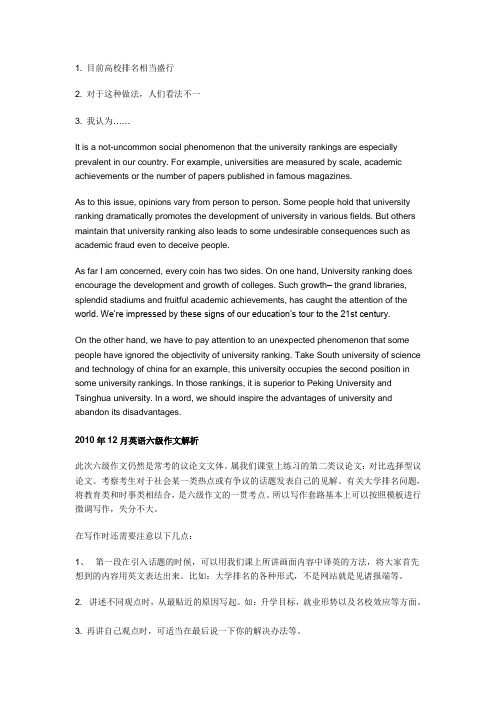
1. 目前高校排名相当盛行2. 对于这种做法,人们看法不一3. 我认为……It is a not-uncommon social phenomenon that the university rankings are especially prevalent in our country. For example, universities are measured by scale, academic achievements or the number of papers published in famous magazines.As to this issue, opinions vary from person to person. Some people hold that university ranking dramatically promotes the development of university in various fields. But others maintain that university ranking also leads to some undesirable consequences such as academic fraud even to deceive people.As far I am concerned, every coin has two sides. On one hand, University ranking does encourage the development and growth of colleges. Such growth– the grand libraries, splendid stadiums and fruitful academic achievements, has caught the attention of the world. We’re impressed by these signs of our education’s tour to the 21st century.On the other hand, we have to pay attention to an unexpected phenomenon that some people have ignored the objectivity of university ranking. Take South university of science and technology of china for an example, this university occupies the second position in some university rankings. In those rankings, it is superior to Peking University and Tsinghua university. In a word, we should inspire the advantages of university and abandon its disadvantages.2010年12月英语六级作文解析此次六级作文仍然是常考的议论文文体。
2010年12月答案
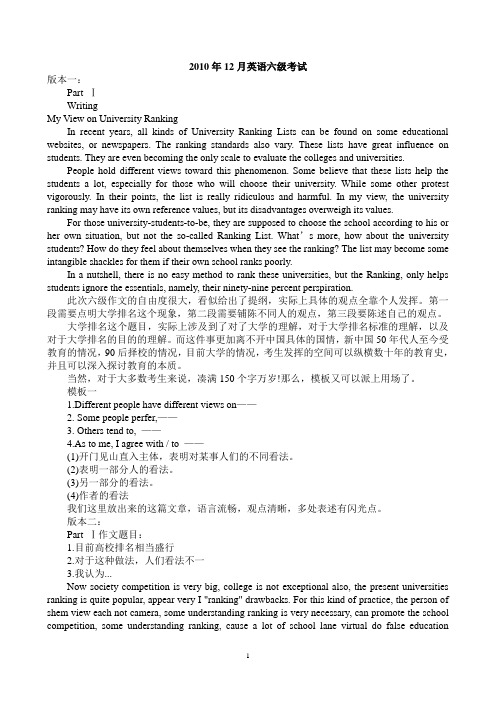
2010年12月英语六级考试版本一:Part ⅠWritingMy View on University RankingIn recent years, all kinds of University Ranking Lists can be found on some educational websites, or newspapers. The ranking standards also vary. These lists have great influence on students. They are even becoming the only scale to evaluate the colleges and universities.People hold different views toward this phenomenon. Some believe that these lists help the students a lot, especially for those who will choose their university. While some other protest vigorously. In their points, the list is really ridiculous and harmful. In my view, the university ranking may have its own reference values, but its disadvantages overweigh its values.For those university-students-to-be, they are supposed to choose the school according to his or her own situation, but not the so-called Ranking List. What’s more, how about the university students? How do they feel about themselves when they see the ranking? The list may become some intangible shackles for them if their own school ranks poorly.In a nutshell, there is no easy method to rank these universities, but the Ranking, only helps students ignore the essentials, namely, their ninety-nine percent perspiration.此次六级作文的自由度很大,看似给出了提纲,实际上具体的观点全靠个人发挥。
2010年12月英语六级完整版答案

Part Ⅰ作文题目:1.目前高校排名相当盛行2.对于这种做法,人们看法不一3.我认为...(作文参考范文:略~ 自己掂量吧!>@< 哈)Part Ⅱ快速阅读1.A .not be sustained in the long term.2.B .Intergenerational conflicts will intensify.3.D.politicians are afraid of losing votes in the next election。
4.A.allow people to work longer。
5.D .younger workers are readily available6.B.large numbers of immigrants from overseas7.B.They find it hard to balance career and family.8.take risks9.mostly have families10.military servicePart Ⅲ听力11.A.The man is the manager of the apartment building 12.B.How the pictures will turn out.13.C.The suitcase can be fixed in time.14.B.He needs a vehicle to be used in harsh weather.15.A.She has made up her mind to resign.16.D.Replace the shirt with one of some other material.17.D.At a “Lost and Found”18.C.Convert in into a hotel19.D.Careful pplotting and ciueing.20.D.To be entirely alone.21.C.They look at the world in a detached manner.22.B.Like it or not, you have to use them.23.D.The monopoly of British Railways.24. B .Competition from other modes of transport.25.D.They lose a lot of money.26.C.Many coastal cities will be coveied.27.B.How unstable the West Antarctic ice sheet is.28.A.It collapsed at least once in the past 1.3 million years. 29.A.The West Antarctic region was once an open ocean. 30.B.Whether a deleted photo is immediately removed from the web.31.B.The way they store data.32.C.When the URL is reused.33.A.Some iced coffees have as many calories as a hot dinner. 34.B.Exercies at the gym.35.C.Many cancer cases could be prevented.36.diverse.37.tragic.38.commit.39.outcome.40.scale.41.colleagues42.accurate43.averages44.Students with high hope set themselves higher goals and know how to work to attain them.45.went beyond the simple notion that hope is merely the sense that everything will turn out all right46.Having hope means believing you have both the will and the way to accomplish your goals whatever they may be."原文:Psychologists are finding that hope plays a surprisingly vital role in giving people a measurable advantage in zones of 36.diverse as academic achievement, bearing up in tough jobs and coping with tragic illness. And by contrast, the loss o..Psychologists are finding that hope plays a surprisingly vital role in giving people a measurable advantage in zones of diverse as academic achievement, bearing up in tough jobs and coping with 37.tragic illness. And by contrast, the loss of hope is turning out to be a stronger sign that a person may 38.commit suicide than other factors long thought to be more likely risks."Hope’s proved a powerful predictor of 39.outcome in every study we’ve done so far.” said Doctor Charles R Snider. A psychologist who has devi sed a 40.scale to assess how much hope a person has. For example, in research with 3920 college students, Doctor Snider and his 41.colleagues found that the level of hope among freshmen at the beginning of their first semester was a more 42.accurate predictor of their college grades than were their SAT scores or their grade point 43.averages in high school-the two measures most commonly used to predict college performance."44.Students with high hope set themselves higher goals and know how to work to attain them.” Doctor Snider said. When you compare students of equivalent intelligence and past academic achievements, what sets them apart is hope.In devising a way to assess hope scientifically, Doctor Snider 45.went beyond the simple notion that hope is merely the sense that everything will turn out all right. That notion is not concrete enough and it blurs two keycomponen ts of hope.” Doctor Snider said,"46.Having hope means believing you have both the will and the way to accomplish your goals whatever they may be."PartⅣ阅读SECTIONA47.feminine and weak48.lose composure49.stress-related disorders50.their relationship with partners51.AggressiveSECTIONB(1)52. A .solve virtually existing all problems53.D.They realized that science and technology alone were no guarantee for a better world.54.C.America is lagging behind in the STEMS disciplines. 55.A.Insufficient funding.56. C .Humanistic thinking helps cultivate and define our culture and values.(2)57.D.It will be some time before a new Einstein emerges.58.B.His independent and abstract thinking59.D.They often go into fields yielding greater financial benefits. 60.D.Nobody will read papers on apparently ridiculous theories. 61.B.was little known in academic circlesPartⅤ完形填空62. B set out set out plans63. D abandoning abandon64. A with struggle with65. B intends intend to66. A exceeded67. A on68. D charge69. C such as70. B free71. C acknowledged72. C bet73. C circulation74. A behind75. B While76. D claim77. C maintains78. A like79. D serious80. C suffered81. D loanPart Ⅵ翻译82.There is no denying that you ___________(越仔细越好) in dealing with this matter.无可否认,处理这件事,越仔细越好。
2010年12月六级答案及分析(完整版)
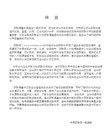
M: Oh, I think they would have. They’re disappearing fast in America. Er, the French railways lose 1 billion ponds a year. The German railways, 2 billion ponds a year. But you see, those governments are preparing to pour money into the transport system to keep it going.
M: Some people who write to me say this. They say that if you didn’t have monopoly, you wouldn’t be able to do the things you do. Well, I don’t think we do anything deliberately to upset our customers. We have particular problems. Since 1946, when the Transport Act came in, we were nationalized.
Q: What does the man mean?
14
M: This truck looks like what I need but I’m worried about maintenance. For us it’ll have to operate for long periods of time in very cold temperatures.
0Nbjpi2010年12月大学英语六级真题及答案范文
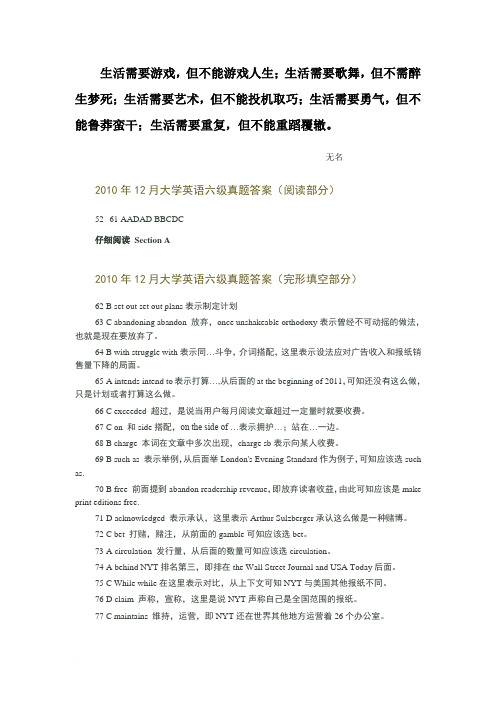
生活需要游戏,但不能游戏人生;生活需要歌舞,但不需醉生梦死;生活需要艺术,但不能投机取巧;生活需要勇气,但不能鲁莽蛮干;生活需要重复,但不能重蹈覆辙。
-----无名2010年12月大学英语六级真题答案(阅读部分)52--61 AADAD BBCDC仔细阅读Section A2010年12月大学英语六级真题答案(完形填空部分)62 B set out set out plans表示制定计划63 C abandoning abandon 放弃,once unshakeable orthodoxy表示曾经不可动摇的做法,也就是现在要放弃了。
64 B with struggle with表示同…斗争,介词搭配,这里表示设法应对广告收入和报纸销售量下降的局面。
65 A intends intend to表示打算…,从后面的at the beginning of 2011,可知还没有这么做,只是计划或者打算这么做。
66 C exceeded 超过,是说当用户每月阅读文章超过一定量时就要收费。
67 C on 和side搭配,on the side of …表示拥护…;站在…一边。
68 B charge 本词在文章中多次出现,charge sb表示向某人收费。
69 B such as 表示举例,从后面举London's Evening Standard作为例子,可知应该选such as.70 B free 前面提到abandon readership revenue,即放弃读者收益,由此可知应该是make print editions free.71 D acknowledged 表示承认,这里表示Arthur Sulzberger承认这么做是一种赌博。
72 C bet 打赌,赌注,从前面的gamble可知应该选bet。
73 A circulation 发行量,从后面的数量可知应该选circulation。
2010年12月英语六级真题及详细答案解析【完整版】[1]
![2010年12月英语六级真题及详细答案解析【完整版】[1]](https://img.taocdn.com/s3/m/b5d1a5d584254b35eefd34e1.png)
gniknaR ytisrevinU no sweiV yM ……来看我在 .3 ;一不法看们人法做种这于对 .2 ;行盛当相名排校高前目 .1 .woleb nevig eniltuo eht gniwollof sdrow 051 tsael ta etirw dluohs uoY .gniknaR ytisrevinU no sweiV yM deltitne yasse trohs a etirw ot setunim 03 dewolla era uoy ,trap siht roF :noitceriD )setunim 03( gnitirW I traP 题真试考级六语英学大月 21 年 0102
4
nrut elpoep redlo dna— 05 revo eb lliw seirtnuoc naeporuE nretsew ni esoht fo tsom dna aciremA ni sretov eht flah tuoba ,tsetal eht ta 5202 yB .seno regnuoy naht sksir ekat ot denilcnisid ylgnorts erom dna evitavonni ssel eb yam seiteicos redlO .ecalp tnereffid a emoceb ylwols lliw dlrow eht tub ,tey elihw a etiuq rof ton tsael ta ,dlrow eht fo dne eht eb ton lliw tI ?pu kcip ton seod seirtnuoc gniega ni ytilitref fi dnA .dlihc eno tsuj gnivah yb esimorpmoc netfo yehT .reerac dna ylimaf enibmoc ot drah ti dnif nemoW .seilim af egral ot detpada llew ton si seirtnuoc hcir ni efil nabru nredoM .erac dlihc erom gnidivorp ro sevitnecni laicnanif gnireffo fo rettam elpmis a ton si ti tuB .srehto naht yllufsseccus erom emos ,deirt evah m eht fo rebmun A .nerdlihc nwo rieht fo erom gnivah yb sevlesmeht )轻年使( etanevujer ot evah dluow seirtnuoc ”dlo“ ,toor sti ta snoitalupop gniega fo melborp eht elkcat oT .elbisaefnu yllacitilop eb dluow sesaercni gib rehtruF .hgih oot si noitargimmi taht kniht ydaerla seirtnuoc hcir tsom ni elpoep taht wohs sllop noinipo cilbuP .tneserp ta sah ti stnargimmi wef eht fo elpitlum egral a deen dluow napaJ .seno redlo eht ni semit eerht dna ,seirtnuoc lufhtuoy tsom s’eporuE nretsew ni ezis tnerruc rieht eciwt tsael ta ot :etasnepmoc ot ylsuomrone esaercni ot evah dluow stnargimmi fo swolfni taht hcum os knirhs ot tes era seirtnuoc hcir ni secrof ruobal sedaced wef txen eht revo tuB .htworg cim onoce pu peek dna seuneveerofeb gniega noitalupop nees reven sah dlrow ehT nwonknU eht otnI .egassap eht ni nevig noitamrofni eht htiw secnetnes eht etelpmoc ,01- 8 snoitseuq roF .]D[ dna ]C[ ,]B[ ,]A[ dekram seciohc ruof eht morf rewsna tseb eht esoohc ,7- 1 snoitseuq roF .1 teehS rewsnA no snoitseuq eht rewsna dna ylkciuq egassap eht revo og ot setunim 51 evah lliw uoy ,trap siht nI :snoitceriD )setunim 51( )gninnacS dna gnimmikS( noisneherpmoC gnidaeR II traP .
2010年12月大学英语六级真题及答案(完整详细版)

2010年12月大学英语六级考试真题Part I Writing (30 minutes)Direction: For this part, you are allowed 30 minutes to write a short essay entitled My Views on University Ranking. You should write at least 150 words following the outline given below.1. 目前高校排名相当盛行;2. 对于这种做法人们看法不一;3. 在我看来……My Views on University Ranking.Part II Reading Comprehension (Skimming and Scanning) (15 minutes)Directions: In this part, you will have 15 minutes to go over the passage quickly and answer the questions on Answer Sheet 1. For questions 1-7, choose the best answer from the four choices marked [A], [B], [C] and [D]. For questions 8-10, complete the sentences with the information given in the passage.Into the UnknownThe world has never seen population ageing before. Can it cope?Until the early 1990s nobody much thought about whole populations getting older. The UN had the foresight to convene a “world assembly on ageing” back in 1982, but that came and went. By 1994 the World Bank had noticed that something big was happening. In a report entitled “Averting the Old Age Crisis”, it argued that pension arrangements in most countries were unsustainable.For the next ten years a succession of books, mainly by Americans, sounded the alarm. They had titles like Young vs Old, Gray Dawn and The Coming Generational Storm, and their messagewas blunt: health-care systems were heading for the rocks, pensioners were taking young people to the cleaners, and soon there would be intergenerational warfare.Since then the debate has become less emotional, not least because a lot more is known about the subject. Books, conferences and research papers have multiplied. International organisations such as the OECD and the EU issue regular reports. Population ageing is on every agenda, from G8 economic conferences to NATO summits. The World Economic Forum plans to consider the future of pensions and health care at its prestigious Davos conference early next year. The media, including this newspaper, are giving the subject extensive coverage.Whether all that attention has translated into sufficient action is another question. Governments in rich countries now accept that their pension and health-care promises will soon become unaffordable, and many of them have embarked on reforms, but so far only timidly. That is not surprising: politicians with an eye on the next election will hardly rush to introduce unpopular measures that may not bear fruit for years, perhaps decades.The outline of the changes needed is clear. To avoid fiscal (财政) meltdown, public pensions and health-care provision will have to be reined back severely and taxes may have to go up. By far the most effective method to restrain pension spending is to give people the opportunity to work longer, because it increases tax revenues and reduces spending on pensions at the same time. It may even keep them alive longer. John Rother, the AARP’s head of policy and strategy, points to studies showing that other things being equal, people who remain at work have lower death rates than their retired peers.Younger people today mostly accept that they will have to work for longer and that their pensions will be less generous. Employers still need to be persuaded thatolder workers are worth holding on to. That may be because they have had plenty of younger ones to choose from, partly thanks to the post-war baby-boom and partly because over the past few decades many more women have entered the labour force, increasing employers’ choice. But the reservoir of women able and willing to take up paid work is running low, and the baby-boomers are going grey.In many countries immigrants have been filling such gaps in the labour force as have already emerged (and remember that the real shortage is still around ten years off). Immigration in the developed world is the highest it has ever been, and it is making a useful difference. In still-fertile America it currently accounts for about 40% of total population growth, and in fast-ageing western Europe for about 90%.On the face of it, it seems the perfect solution. Many developing countries have lots of young people in need of jobs; many rich countries need helping hands that will boost tax revenues and keep up economic growth. But over the next few decades labour forces in rich countries are set to shrink so much that inflows of immigrants would have to increase enormously to compensate: to at least twice their current size in western Europe’s most youthful countries, and three times in the older ones. Japan would need a large multiple of the few immigrants it has at present. Public opinion polls show that people in most rich countries already think that immigration is too high. Further big increases would be politically unfeasible.To tackle the problem of ageing populations at its root, “old” countries would have to rejuvenate (使年轻) themselves by having more of their own children. A number of them have tried, some more successfully than others. But it is not a simple matter of offering financial incentives or providing more child care. Modern urban life in rich countries is not well adapted to large families. Women find it hard to combine family and career. They often compromise by having just one child.And if fertility in ageing countries does not pick up? It will not be the end of the world, at least not for quite a while yet, but the world will slowly become a different place. Older societies may be less innovative and more strongly disinclined to take risks than younger ones. By 2025 at the latest, about half the voters in America and most of those in western European countries will be over 50—and older people turn out to vote in much greater number than younger ones. Academic studies have found no evidence so far that older voters have used their power at the ballot box to push for policies that specifically benefit them, though if in future there are many more of them they might start doing so.Nor is there any sign of the intergenerational warfare predicted in the 1990s. After all, older people themselves mostly have families. In a recent study of parents and grown-up children in 11European countries, Karsten Hank of Mannheim University found that 85% of them lived within 25km of each other and the majority of them were in touch at least once a week.Even so, the shift in the centre of gravity to older age groups is bound to have a profound effect on societies, not just economically and politically but in all sorts of other ways too. Richard Jackson and Neil Howe of America’s CSIS, in a thoughtful book called The Graying of the Great Powers, argue that, among other things, the ageing of the developed countries will have a number of serious security implications.For example, the shortage of young adults is likely to make countries more reluctant to commit the few they have to military service. In the decades to 2050, America will find itself playing an ever-increasing role in the developed world’s defence effort. Because America’s population will still be growing when that of most other developed countries is shrinking, America will be the only developed country that still matters geopolitically (地缘政治上).Ask me in 2020There is little that can be done to stop population ageing, so the world will have to live with it. But some of the consequences can be alleviated. Many experts now believe that given the right policies, the effects, though grave, need not be catastrophic. Most countries have recognised the need to do something and are beginning to act.But even then there is no guarantee that their efforts will work. What is happening now is historically unprecedented. Ronald Lee, director of the Centre on the Economics and Demography of Ageing at the University of California, Berkeley, puts it briefly and clearly: “We don’t really know what population ageing will be like, because nobody has done it yet. “注意:此部分试题请在答题卡1上作答。
2010年12月大学英语六级考试真题及答案及作文及听力原文学习啊
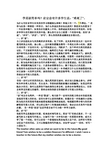
学英语简单吗?肯定会有许多学生说:“难死了”。
为什么有好多学生对英语的学习都感到头疼呢?答案只有一个:“不得法。
” 英语与汉语一样都是一种语言,为什么你说汉语会如此流利?那是因为你置身于一个汉语环境中,如果你在伦敦呆上半年,保准说起英语来会非常流利。
但很多中学生没有很好的英语环境,那么你可以自己设置一个英语环境,坚持“多说”、“多听”、“多读”、“多写”,那么你的英语成绩肯定会很出色。
一、多“说”。
自己多创造机会与英语教师多讲英语,见了同学,尤其是和好朋友在一起时尽量用英语去问候,谈心情……这时候你需随身携带一个英汉互译小词典,遇到生词时查一下这些生词,也不用刻意去记,用的多了,这个单词自然而然就会记住。
千万别把学英语当成负担,始终把它当成一件有趣的事情去做。
或许你有机会碰上外国人,你应大胆地上去跟他打招呼,和他谈天气、谈风景、谈学校……只是别问及他的年纪,婚史等私人问题。
尽量用一些你学过的词汇,句子去和他谈天说地。
不久你会发现与老外聊天要比你与中国人谈英语容易的多。
因为他和你交谈时会用许多简单词汇,而且不太看重说法,你只要发音准确,准能顺利地交流下去。
只是你必须要有信心,敢于表达自己的思想。
如果没有合适的伙伴也没关系,你可以拿过一本书或其它什么东西做假想对象,对它谈你一天的所见所闻,谈你的快乐,你的悲伤等等,长此坚持下去你的口语肯定会有较大的提高。
二、多“听”寻找一切可以听英语的机会。
别人用英语交谈时,你应该大胆地去参与,多听听各种各样人的发音,男女老少,节奏快的慢的你都应该接触到,如果这样的机会少的话,你可以选择你不知内容的文章去听,这将会对你帮助很大,而你去听学过的课文的磁带,那将会对你的语言语调的学习有很大的帮助。
三、多“读”。
“读”可以分为两种。
一种是“默读”。
每天给予一定时间的练习将会对你提高阅读速度有很大的好处,读的内容可以是你的课本,但最好是一些有趣的小读物,因为现在的英语高考越来越重视阅读量和阅读速度。
2010年12月英语六级真题答案及详解(完整版)
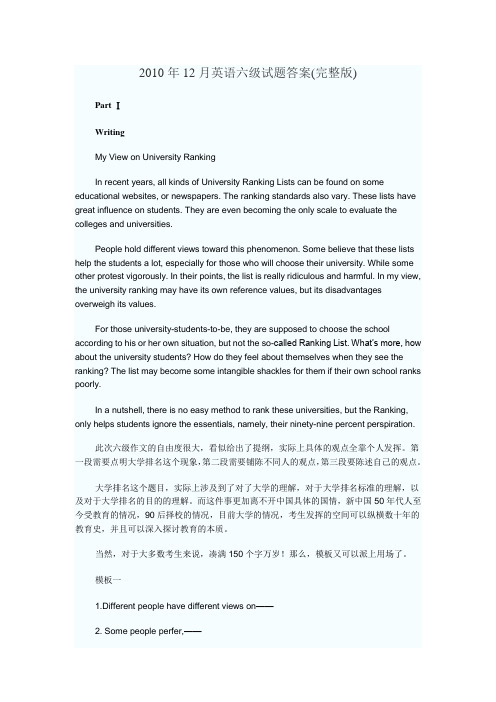
2010年12月英语六级试题答案(完整版)Part ⅠWritingMy View on University RankingIn recent years, all kinds of University Ranking Lists can be found on some educational websites, or newspapers. The ranking standards also vary. These lists have great influence on students. They are even becoming the only scale to evaluate the colleges and universities.People hold different views toward this phenomenon. Some believe that these lists help the students a lot, especially for those who will choose their university. While some other protest vigorously. In their points, the list is really ridiculous and harmful. In my view, the university ranking may have its own reference values, but its disadvantages overweigh its values.For those university-students-to-be, they are supposed to choose the school according to his or her own situation, but not the so-called Ranking List. What’s more, how about the university students? How do they feel about themselves when they see the ranking? The list may become some intangible shackles for them if their own school ranks poorly.In a nutshell, there is no easy method to rank these universities, but the Ranking, only helps students ignore the essentials, namely, their ninety-nine percent perspiration.此次六级作文的自由度很大,看似给出了提纲,实际上具体的观点全靠个人发挥。
2010年12月英语四六级翻译答案及解析

参考答案(翻译部分)87.___________________(为了确保他参加会议),I called him up in advance.解析:In order to ensure him to attend the meetingTo ensure his attendance at the meeting【结构分析】本题句子的主干“I called him up in advance”已经给出,无需翻译,需要翻译部分为“为了确保他能参加会议”。
该部分在句子中作目的状语【考点解释】本题考查是目的状语。
①目的状语可以由to/in order to来引导。
②确保ensure sb to do 确保某人做某事,ensure sth 确保某事【原句精释】为了确保他参加会议,我已经提前给他电话了。
88.The significant museum________________(据说建成于)about a hundred years ago.解析:is said to have been built【结构分析】本题句子的主语为the significant museum,缺谓语,即(据说建成于)about a hundred years ago为时间状语。
【考点解释】本题重点考查:①被动语态。
主语museum与动词build之间为被动关系; 且bulid这一动作发生在过去。
②据说be said to;be said to+ 动词不定式的完成时,表示不定式表示的动作已经完成。
【原句精释】据说这座意义深远的博物馆大约建成于一百年前。
89.There would be no life on earth ____________________ (没有地球独特的环境)。
解析: without its unique environmentbut for its unique environment【结构分析】本题句子含有There be结构。
2010年12月大学英语六级真题答案

2010年12月大学英语六级真题答案(阅读部分)52--61 AADAD BBCDC仔细阅读Section A2010年12月大学英语六级真题答案(完形填空部分)62 B set out set out plans表示制定计划63 C abandoning abandon 放弃,once unshakeable orthodoxy表示曾经不可动摇的做法,也就是现在要放弃了。
64 B with struggle with表示同…斗争,介词搭配,这里表示设法应对广告收入和报纸销售量下降的局面。
65 A intends intend to表示打算…,从后面的at the beginning of 2011,可知还没有这么做,只是计划或者打算这么做。
66 C exceeded 超过,是说当用户每月阅读文章超过一定量时就要收费。
67 C on 和side搭配,on the side of …表示拥护…;站在…一边。
68 B charge 本词在文章中多次出现,charge sb表示向某人收费。
69 B such as 表示举例,从后面举London's Evening Standard作为例子,可知应该选such as.70 B free 前面提到abandon readership revenue,即放弃读者收益,由此可知应该是make print editions free.71 D acknowledged 表示承认,这里表示Arthur Sulzberger承认这么做是一种赌博。
72 C bet 打赌,赌注,从前面的gamble可知应该选bet。
73 A circulation 发行量,从后面的数量可知应该选circulation。
74 A behind NYT排名第三,即排在the Wall Street Journal and USA Today后面。
75 C While while在这里表示对比,从上下文可知NYT与美国其他报纸不同。
- 1、下载文档前请自行甄别文档内容的完整性,平台不提供额外的编辑、内容补充、找答案等附加服务。
- 2、"仅部分预览"的文档,不可在线预览部分如存在完整性等问题,可反馈申请退款(可完整预览的文档不适用该条件!)。
- 3、如文档侵犯您的权益,请联系客服反馈,我们会尽快为您处理(人工客服工作时间:9:00-18:30)。
2010年12月英语六级翻译答案及解析
2010年12月大学英语六级考试参考答案(翻译部分)
82. There is no denying that you ___________(越仔细越好) in dealing with this matter.
解析:can never be too careful / can not be too careful
【考点解释】本题考查“越仔细越好”“再…也不为过”的固定搭配,即can never be too/can not be too + adj.
【原句精释】无可否认,处理这件事,越仔细越好。
83. Only when I reached my thirties __________________________ (我才意识到读书是不能被忽视的)
解析:did I realize that reading cannot be neglected
did I realize that reading is unignorable
【考点解释】本题考查由only when 引起的局部倒装。
当only when置于句首,主句用局部倒装,即将助动词置于主语前面。
only when引导句子时态为过去时(reached),为保持时态一致,主句助动词用did;注意被动语态的使用,reading与neglect为被动关系。
同时也可以使用be+adj的结构。
【原句精释】直到三十岁,我才意识不能忽视读书。
84. Much ___________________ (使研究人员感到惊讶),the outcome of the experiment was far better than they had expected.
解析:to the researchers’ surprise
【考点解释】本题考查固定搭配to one’s surprise 使…惊讶的是…
【原句精释】让研究人员大为惊讶的是,实验结果比他们的预计好得多。
85. Oh, my, I can’t find my key; __________________________(我一定是把它放在哪儿了)。
解析:I must have left / put it somewhere.
【考点解释】本题考查对过去事情的肯定的猜测,即must have+过去分词,leave与put都有放置的意思,但leave强调遗忘在…,较之put,leave更贴合题意。
【原句精释】天啊,我找不到钥匙。
我一定是把它放在哪儿了。
86.I ________________________(宁愿加入你们去做义工)than go to the beach for a holiday.
解析:would rather join you as a volunteer
【考点解释】考查结构“宁愿…也不愿…”, 因题干中已存在“than go”的结构,只能使用“would rather do rather than do”。
加入… join sb
【原句精释】我宁愿加入你们去做义工,也不愿到海边去度假。
